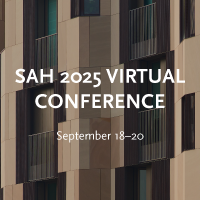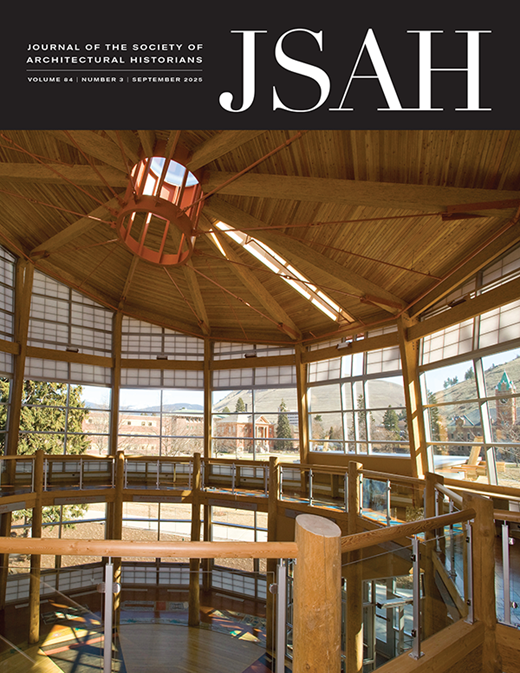-
Membership
Membership
Anyone with an interest in the history of the built environment is welcome to join the Society of Architectural Historians -
Conferences
Conferences
SAH Annual International Conferences bring members together for scholarly exchange and networking -
Publications
Publications
Through print and digital publications, SAH documents the history of the built environment and disseminates scholarship -
Programs
Programs
SAH promotes meaningful engagement with the history of the built environment through its programs -
Jobs & Opportunities
Jobs & Opportunities
SAH provides resources, fellowships, and grants to help further your career and professional life -
Support
Support
We invite you to support the educational mission of SAH by making a gift, becoming a member, or volunteering -
About
About
SAH promotes the study, interpretation, and conservation of the built environment worldwide for the benefit of all
SAH Announces Nominations for Incoming Board Members for 2023
Jan 25, 2023
by
SAH News
The Society of Architectural Historians is pleased to announce the nominations for incoming board members in 2023. The SAH Nominating Committee recommends the following individuals for election to the SAH Board at the Annual Business Meeting to be held at the Hôtel Bonaventure Montréal on Wednesday, April 12, 2023, at 6:00 pm. Proxy ballots will be sent via email for SAH members who are unable to attend the meeting.
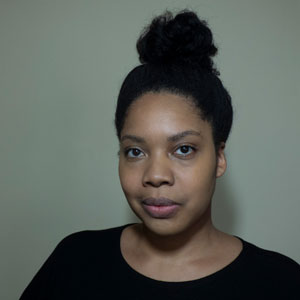 Charlette Caldwell is currently a doctoral student and a Provost Diversity Fellow studying the history and theory of architecture at Columbia University. Her research focuses broadly on nineteenth-century American architecture through a vernacular architectural perspective. Her dissertation examines how cultural, economic, and political processes influenced the building culture and architecture of the African Methodist Episcopal Church before its official founding in 1816 to the 1930s. This study looks to unearth how Black church building reflected issues of class and identity amongst AME leadership and laypeople, demonstrating how the AME culture of building formed within a crucible marred by the vestiges of slavery and violence in the United States. Caldwell received a bachelor’s in architecture from Syracuse University and a Master of Science in historic preservation from the Weitzman School of Design at the University of Pennsylvania. Caldwell's work has been supported by the Weitzman’s Center for the Preservation of Civil Rights Sites, where she worked as a Research Fellow; the Society of Architectural Historians, where she serves on the Graduate Student Advisory Committee; the Historic American Building Survey; and the Athenaeum of Philadelphia. Caldwell was also the HABS-SAH Sally Kress Tompkins Fellow in the summer of 2021.
Charlette Caldwell is currently a doctoral student and a Provost Diversity Fellow studying the history and theory of architecture at Columbia University. Her research focuses broadly on nineteenth-century American architecture through a vernacular architectural perspective. Her dissertation examines how cultural, economic, and political processes influenced the building culture and architecture of the African Methodist Episcopal Church before its official founding in 1816 to the 1930s. This study looks to unearth how Black church building reflected issues of class and identity amongst AME leadership and laypeople, demonstrating how the AME culture of building formed within a crucible marred by the vestiges of slavery and violence in the United States. Caldwell received a bachelor’s in architecture from Syracuse University and a Master of Science in historic preservation from the Weitzman School of Design at the University of Pennsylvania. Caldwell's work has been supported by the Weitzman’s Center for the Preservation of Civil Rights Sites, where she worked as a Research Fellow; the Society of Architectural Historians, where she serves on the Graduate Student Advisory Committee; the Historic American Building Survey; and the Athenaeum of Philadelphia. Caldwell was also the HABS-SAH Sally Kress Tompkins Fellow in the summer of 2021.
 Peter H. Christensen is the Arthur Satz Professor of the Humanities, the Ani and Mark Gabrellian Director of the Humanities Center, and director of the Mellon Graduate Program in the Digital Humanities at the University of Rochester. He is also currently a visiting professor in the Department of Architecture at Cornell University. His specialization is modern architectural and environmental history, particularly of Germany, Central Europe and the Middle East. His theoretical interests center on issues of geopolitics and multiculturalism. He also maintains a strong interest in infrastructure and its history. He explores critical applications of the digital humanities in his research and teaching, which includes a major research project entitled Architectural Biometrics. He is the author of Germany and the Ottoman Railways: Art, Empire, and Infrastructure (Yale University Press, 2017), winner of the Alice Davis Hitchcock Book Award from the Society of Architectural Historians, Precious Metal: German Steel, Modernity, and Ecology (Penn State Press, 2022), and the forthcoming Prior Art: Patents and the Nature of Invention in Architecture (MIT Press, 2024). Christensen is a recipient of fellowships from the John Solomon Guggenheim Foundation, the Institute for Advanced Study, the National Endowment of the Humanities, the New York State Council of the Arts, The Yale / Paul Mellon Centre for British Art, and other agencies.
Peter H. Christensen is the Arthur Satz Professor of the Humanities, the Ani and Mark Gabrellian Director of the Humanities Center, and director of the Mellon Graduate Program in the Digital Humanities at the University of Rochester. He is also currently a visiting professor in the Department of Architecture at Cornell University. His specialization is modern architectural and environmental history, particularly of Germany, Central Europe and the Middle East. His theoretical interests center on issues of geopolitics and multiculturalism. He also maintains a strong interest in infrastructure and its history. He explores critical applications of the digital humanities in his research and teaching, which includes a major research project entitled Architectural Biometrics. He is the author of Germany and the Ottoman Railways: Art, Empire, and Infrastructure (Yale University Press, 2017), winner of the Alice Davis Hitchcock Book Award from the Society of Architectural Historians, Precious Metal: German Steel, Modernity, and Ecology (Penn State Press, 2022), and the forthcoming Prior Art: Patents and the Nature of Invention in Architecture (MIT Press, 2024). Christensen is a recipient of fellowships from the John Solomon Guggenheim Foundation, the Institute for Advanced Study, the National Endowment of the Humanities, the New York State Council of the Arts, The Yale / Paul Mellon Centre for British Art, and other agencies.
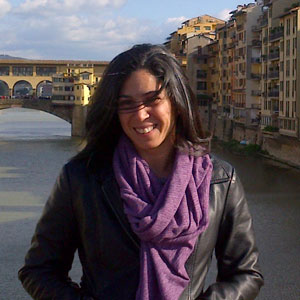 Heba Mostafa is Assistant Professor of Islamic Art and Architecture at the Department of History of Art at the University of Toronto. She received her doctorate from Cambridge University’s Department of Architecture in 2012 and holds degrees in architecture and the history of Islamic architecture from Cairo University and the American University in Cairo. Her research explores the formation of Islamic architecture through the lens of early Islamic sectarianism and governance, addressing the mediation of political conflict and confessional division through architecture at the intersection of politics and the sacred. She focuses on Islam’s interface with late antiquity, Christianity, and Judaism through commemorative architecture, pilgrimage, and ritual practice, with a particular focus on Jerusalem and Cairo.
Heba Mostafa is Assistant Professor of Islamic Art and Architecture at the Department of History of Art at the University of Toronto. She received her doctorate from Cambridge University’s Department of Architecture in 2012 and holds degrees in architecture and the history of Islamic architecture from Cairo University and the American University in Cairo. Her research explores the formation of Islamic architecture through the lens of early Islamic sectarianism and governance, addressing the mediation of political conflict and confessional division through architecture at the intersection of politics and the sacred. She focuses on Islam’s interface with late antiquity, Christianity, and Judaism through commemorative architecture, pilgrimage, and ritual practice, with a particular focus on Jerusalem and Cairo.
 Valentina Rozas-Krause is an assistant professor of design and architecture at Universidad Adolfo Ibáñez in Chile. She is both a professional architect and a historian of the built environment with a focus on global cultural practices across the Americas and Europe. Rozas-Krause recently completed her postdoc as a LSA Collegiate Fellow in the History of Art Department at the University of Michigan. She holds a Ph.D. in architectural history from the University of California, Berkeley, as well as a Master’s degree in urban planning and a B.Arch, from Pontificia Universidad Católica de Chile. Rozas-Krause is the editor of Decolonization, a special issue of journal ARQ (2022), and has published two books: Ni Tan Elefante, Ni Tan Blanco: Arquitectura, urbanismo y política en la trayectoria del Estadio Nacional (Ril, 2014) and the co-edited volume Disputar la Ciudad (Bifurcaciones, 2018). These publications join peer-reviewed articles in History & Memory, e-flux, Latin American Perspectives, Anos 90, ARQ, Revista 180, Cuadernos de Antropología Social, and Bifurcaciones alongside a chapter in Neocolonialism and Built Heritage (Routledge, 2020). Currently she is working on two new book projects, the collective volume Breaking the Bronze Ceiling: Memorials and Gender, about female representation in public space, and the monograph Memorials and the Cult of Apology (University of Texas Press), which examines the role that memorials play in processes of symbolic and material reparation. Her research has been supported by numerous institutions, including Mellon/ACLS, the Townsend Center for the Humanities, the UC Berkeley Institute of International and Comparative Studies, the German DAAD, and the Chilean National Agency for Research and Development.
Valentina Rozas-Krause is an assistant professor of design and architecture at Universidad Adolfo Ibáñez in Chile. She is both a professional architect and a historian of the built environment with a focus on global cultural practices across the Americas and Europe. Rozas-Krause recently completed her postdoc as a LSA Collegiate Fellow in the History of Art Department at the University of Michigan. She holds a Ph.D. in architectural history from the University of California, Berkeley, as well as a Master’s degree in urban planning and a B.Arch, from Pontificia Universidad Católica de Chile. Rozas-Krause is the editor of Decolonization, a special issue of journal ARQ (2022), and has published two books: Ni Tan Elefante, Ni Tan Blanco: Arquitectura, urbanismo y política en la trayectoria del Estadio Nacional (Ril, 2014) and the co-edited volume Disputar la Ciudad (Bifurcaciones, 2018). These publications join peer-reviewed articles in History & Memory, e-flux, Latin American Perspectives, Anos 90, ARQ, Revista 180, Cuadernos de Antropología Social, and Bifurcaciones alongside a chapter in Neocolonialism and Built Heritage (Routledge, 2020). Currently she is working on two new book projects, the collective volume Breaking the Bronze Ceiling: Memorials and Gender, about female representation in public space, and the monograph Memorials and the Cult of Apology (University of Texas Press), which examines the role that memorials play in processes of symbolic and material reparation. Her research has been supported by numerous institutions, including Mellon/ACLS, the Townsend Center for the Humanities, the UC Berkeley Institute of International and Comparative Studies, the German DAAD, and the Chilean National Agency for Research and Development.
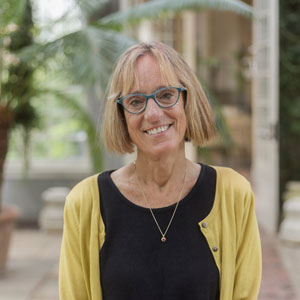 Thaïsa Way, FASLA, FAAR (BS UC Berkeley, Master’s (Architectural History) UVa, PhD Cornell University) serves as Director of Garden and Landscape Studies, Dumbarton Oaks Research Library and Collection, a Harvard University research institution in Washington, DC, and PI for a Mellon Humanities in Place Initiative, “Democracy and Landscape: Race, Identity, and Difference.” She is Professor Emerita in Landscape Architecture at the University of Washington and serves on the faculty of the Graduate School of Design, Harvard University. She is a core leader for the Deans' Equity and Inclusion Initiative, seeking to nurture a diverse community of emerging scholars teaching and researching the built environment to advance socio-ecological and spatial justice, equity, and inclusion. Dr. Way was a 2016 Rome Prize Fellow in Landscape Architecture at the American Academy in Rome. She served as the founding director of Urban@UW, an initiative of the University of Washington. Her book, Unbounded Practices: Women, Landscape Architecture, and Early Twentieth Century Design (UVa Press, 2009/213) was awarded the J.B. Jackson Book Award. Other books include From Modern Space to Urban Ecological Design: the Landscape Architecture of Richard Haag (UW Press, 2015); a co-edited volume with Ken Yocom, Ben Spencer, and Jeff Hou, Now Urbanism: The Future City is Here (Routledge, 2014); the edited collection River Cities/ City Rivers (Harvard Press, 2018); and a collaborative project, GGN 1999–2018 (Timber Press, 2018). She is currently colloborating with Eric Avila on an edited collection “Segregation and Resistance in the Landscapes of the Americas” (forthcoming spring 2023).
Thaïsa Way, FASLA, FAAR (BS UC Berkeley, Master’s (Architectural History) UVa, PhD Cornell University) serves as Director of Garden and Landscape Studies, Dumbarton Oaks Research Library and Collection, a Harvard University research institution in Washington, DC, and PI for a Mellon Humanities in Place Initiative, “Democracy and Landscape: Race, Identity, and Difference.” She is Professor Emerita in Landscape Architecture at the University of Washington and serves on the faculty of the Graduate School of Design, Harvard University. She is a core leader for the Deans' Equity and Inclusion Initiative, seeking to nurture a diverse community of emerging scholars teaching and researching the built environment to advance socio-ecological and spatial justice, equity, and inclusion. Dr. Way was a 2016 Rome Prize Fellow in Landscape Architecture at the American Academy in Rome. She served as the founding director of Urban@UW, an initiative of the University of Washington. Her book, Unbounded Practices: Women, Landscape Architecture, and Early Twentieth Century Design (UVa Press, 2009/213) was awarded the J.B. Jackson Book Award. Other books include From Modern Space to Urban Ecological Design: the Landscape Architecture of Richard Haag (UW Press, 2015); a co-edited volume with Ken Yocom, Ben Spencer, and Jeff Hou, Now Urbanism: The Future City is Here (Routledge, 2014); the edited collection River Cities/ City Rivers (Harvard Press, 2018); and a collaborative project, GGN 1999–2018 (Timber Press, 2018). She is currently colloborating with Eric Avila on an edited collection “Segregation and Resistance in the Landscapes of the Americas” (forthcoming spring 2023).
Charlette Caldwell, Columbia University - Graduate Student Representative
 Charlette Caldwell is currently a doctoral student and a Provost Diversity Fellow studying the history and theory of architecture at Columbia University. Her research focuses broadly on nineteenth-century American architecture through a vernacular architectural perspective. Her dissertation examines how cultural, economic, and political processes influenced the building culture and architecture of the African Methodist Episcopal Church before its official founding in 1816 to the 1930s. This study looks to unearth how Black church building reflected issues of class and identity amongst AME leadership and laypeople, demonstrating how the AME culture of building formed within a crucible marred by the vestiges of slavery and violence in the United States. Caldwell received a bachelor’s in architecture from Syracuse University and a Master of Science in historic preservation from the Weitzman School of Design at the University of Pennsylvania. Caldwell's work has been supported by the Weitzman’s Center for the Preservation of Civil Rights Sites, where she worked as a Research Fellow; the Society of Architectural Historians, where she serves on the Graduate Student Advisory Committee; the Historic American Building Survey; and the Athenaeum of Philadelphia. Caldwell was also the HABS-SAH Sally Kress Tompkins Fellow in the summer of 2021.
Charlette Caldwell is currently a doctoral student and a Provost Diversity Fellow studying the history and theory of architecture at Columbia University. Her research focuses broadly on nineteenth-century American architecture through a vernacular architectural perspective. Her dissertation examines how cultural, economic, and political processes influenced the building culture and architecture of the African Methodist Episcopal Church before its official founding in 1816 to the 1930s. This study looks to unearth how Black church building reflected issues of class and identity amongst AME leadership and laypeople, demonstrating how the AME culture of building formed within a crucible marred by the vestiges of slavery and violence in the United States. Caldwell received a bachelor’s in architecture from Syracuse University and a Master of Science in historic preservation from the Weitzman School of Design at the University of Pennsylvania. Caldwell's work has been supported by the Weitzman’s Center for the Preservation of Civil Rights Sites, where she worked as a Research Fellow; the Society of Architectural Historians, where she serves on the Graduate Student Advisory Committee; the Historic American Building Survey; and the Athenaeum of Philadelphia. Caldwell was also the HABS-SAH Sally Kress Tompkins Fellow in the summer of 2021.Peter H. Christensen, University of Rochester
 Peter H. Christensen is the Arthur Satz Professor of the Humanities, the Ani and Mark Gabrellian Director of the Humanities Center, and director of the Mellon Graduate Program in the Digital Humanities at the University of Rochester. He is also currently a visiting professor in the Department of Architecture at Cornell University. His specialization is modern architectural and environmental history, particularly of Germany, Central Europe and the Middle East. His theoretical interests center on issues of geopolitics and multiculturalism. He also maintains a strong interest in infrastructure and its history. He explores critical applications of the digital humanities in his research and teaching, which includes a major research project entitled Architectural Biometrics. He is the author of Germany and the Ottoman Railways: Art, Empire, and Infrastructure (Yale University Press, 2017), winner of the Alice Davis Hitchcock Book Award from the Society of Architectural Historians, Precious Metal: German Steel, Modernity, and Ecology (Penn State Press, 2022), and the forthcoming Prior Art: Patents and the Nature of Invention in Architecture (MIT Press, 2024). Christensen is a recipient of fellowships from the John Solomon Guggenheim Foundation, the Institute for Advanced Study, the National Endowment of the Humanities, the New York State Council of the Arts, The Yale / Paul Mellon Centre for British Art, and other agencies.
Peter H. Christensen is the Arthur Satz Professor of the Humanities, the Ani and Mark Gabrellian Director of the Humanities Center, and director of the Mellon Graduate Program in the Digital Humanities at the University of Rochester. He is also currently a visiting professor in the Department of Architecture at Cornell University. His specialization is modern architectural and environmental history, particularly of Germany, Central Europe and the Middle East. His theoretical interests center on issues of geopolitics and multiculturalism. He also maintains a strong interest in infrastructure and its history. He explores critical applications of the digital humanities in his research and teaching, which includes a major research project entitled Architectural Biometrics. He is the author of Germany and the Ottoman Railways: Art, Empire, and Infrastructure (Yale University Press, 2017), winner of the Alice Davis Hitchcock Book Award from the Society of Architectural Historians, Precious Metal: German Steel, Modernity, and Ecology (Penn State Press, 2022), and the forthcoming Prior Art: Patents and the Nature of Invention in Architecture (MIT Press, 2024). Christensen is a recipient of fellowships from the John Solomon Guggenheim Foundation, the Institute for Advanced Study, the National Endowment of the Humanities, the New York State Council of the Arts, The Yale / Paul Mellon Centre for British Art, and other agencies.Heba Mostafa, University of Toronto
 Heba Mostafa is Assistant Professor of Islamic Art and Architecture at the Department of History of Art at the University of Toronto. She received her doctorate from Cambridge University’s Department of Architecture in 2012 and holds degrees in architecture and the history of Islamic architecture from Cairo University and the American University in Cairo. Her research explores the formation of Islamic architecture through the lens of early Islamic sectarianism and governance, addressing the mediation of political conflict and confessional division through architecture at the intersection of politics and the sacred. She focuses on Islam’s interface with late antiquity, Christianity, and Judaism through commemorative architecture, pilgrimage, and ritual practice, with a particular focus on Jerusalem and Cairo.
Heba Mostafa is Assistant Professor of Islamic Art and Architecture at the Department of History of Art at the University of Toronto. She received her doctorate from Cambridge University’s Department of Architecture in 2012 and holds degrees in architecture and the history of Islamic architecture from Cairo University and the American University in Cairo. Her research explores the formation of Islamic architecture through the lens of early Islamic sectarianism and governance, addressing the mediation of political conflict and confessional division through architecture at the intersection of politics and the sacred. She focuses on Islam’s interface with late antiquity, Christianity, and Judaism through commemorative architecture, pilgrimage, and ritual practice, with a particular focus on Jerusalem and Cairo.Valentina Rozas-Krause, Universidad Adolfo Ibanez
 Valentina Rozas-Krause is an assistant professor of design and architecture at Universidad Adolfo Ibáñez in Chile. She is both a professional architect and a historian of the built environment with a focus on global cultural practices across the Americas and Europe. Rozas-Krause recently completed her postdoc as a LSA Collegiate Fellow in the History of Art Department at the University of Michigan. She holds a Ph.D. in architectural history from the University of California, Berkeley, as well as a Master’s degree in urban planning and a B.Arch, from Pontificia Universidad Católica de Chile. Rozas-Krause is the editor of Decolonization, a special issue of journal ARQ (2022), and has published two books: Ni Tan Elefante, Ni Tan Blanco: Arquitectura, urbanismo y política en la trayectoria del Estadio Nacional (Ril, 2014) and the co-edited volume Disputar la Ciudad (Bifurcaciones, 2018). These publications join peer-reviewed articles in History & Memory, e-flux, Latin American Perspectives, Anos 90, ARQ, Revista 180, Cuadernos de Antropología Social, and Bifurcaciones alongside a chapter in Neocolonialism and Built Heritage (Routledge, 2020). Currently she is working on two new book projects, the collective volume Breaking the Bronze Ceiling: Memorials and Gender, about female representation in public space, and the monograph Memorials and the Cult of Apology (University of Texas Press), which examines the role that memorials play in processes of symbolic and material reparation. Her research has been supported by numerous institutions, including Mellon/ACLS, the Townsend Center for the Humanities, the UC Berkeley Institute of International and Comparative Studies, the German DAAD, and the Chilean National Agency for Research and Development.
Valentina Rozas-Krause is an assistant professor of design and architecture at Universidad Adolfo Ibáñez in Chile. She is both a professional architect and a historian of the built environment with a focus on global cultural practices across the Americas and Europe. Rozas-Krause recently completed her postdoc as a LSA Collegiate Fellow in the History of Art Department at the University of Michigan. She holds a Ph.D. in architectural history from the University of California, Berkeley, as well as a Master’s degree in urban planning and a B.Arch, from Pontificia Universidad Católica de Chile. Rozas-Krause is the editor of Decolonization, a special issue of journal ARQ (2022), and has published two books: Ni Tan Elefante, Ni Tan Blanco: Arquitectura, urbanismo y política en la trayectoria del Estadio Nacional (Ril, 2014) and the co-edited volume Disputar la Ciudad (Bifurcaciones, 2018). These publications join peer-reviewed articles in History & Memory, e-flux, Latin American Perspectives, Anos 90, ARQ, Revista 180, Cuadernos de Antropología Social, and Bifurcaciones alongside a chapter in Neocolonialism and Built Heritage (Routledge, 2020). Currently she is working on two new book projects, the collective volume Breaking the Bronze Ceiling: Memorials and Gender, about female representation in public space, and the monograph Memorials and the Cult of Apology (University of Texas Press), which examines the role that memorials play in processes of symbolic and material reparation. Her research has been supported by numerous institutions, including Mellon/ACLS, the Townsend Center for the Humanities, the UC Berkeley Institute of International and Comparative Studies, the German DAAD, and the Chilean National Agency for Research and Development.Thaïsa Way, Dumbarton Oaks Research Library and Collection
 Thaïsa Way, FASLA, FAAR (BS UC Berkeley, Master’s (Architectural History) UVa, PhD Cornell University) serves as Director of Garden and Landscape Studies, Dumbarton Oaks Research Library and Collection, a Harvard University research institution in Washington, DC, and PI for a Mellon Humanities in Place Initiative, “Democracy and Landscape: Race, Identity, and Difference.” She is Professor Emerita in Landscape Architecture at the University of Washington and serves on the faculty of the Graduate School of Design, Harvard University. She is a core leader for the Deans' Equity and Inclusion Initiative, seeking to nurture a diverse community of emerging scholars teaching and researching the built environment to advance socio-ecological and spatial justice, equity, and inclusion. Dr. Way was a 2016 Rome Prize Fellow in Landscape Architecture at the American Academy in Rome. She served as the founding director of Urban@UW, an initiative of the University of Washington. Her book, Unbounded Practices: Women, Landscape Architecture, and Early Twentieth Century Design (UVa Press, 2009/213) was awarded the J.B. Jackson Book Award. Other books include From Modern Space to Urban Ecological Design: the Landscape Architecture of Richard Haag (UW Press, 2015); a co-edited volume with Ken Yocom, Ben Spencer, and Jeff Hou, Now Urbanism: The Future City is Here (Routledge, 2014); the edited collection River Cities/ City Rivers (Harvard Press, 2018); and a collaborative project, GGN 1999–2018 (Timber Press, 2018). She is currently colloborating with Eric Avila on an edited collection “Segregation and Resistance in the Landscapes of the Americas” (forthcoming spring 2023).
Thaïsa Way, FASLA, FAAR (BS UC Berkeley, Master’s (Architectural History) UVa, PhD Cornell University) serves as Director of Garden and Landscape Studies, Dumbarton Oaks Research Library and Collection, a Harvard University research institution in Washington, DC, and PI for a Mellon Humanities in Place Initiative, “Democracy and Landscape: Race, Identity, and Difference.” She is Professor Emerita in Landscape Architecture at the University of Washington and serves on the faculty of the Graduate School of Design, Harvard University. She is a core leader for the Deans' Equity and Inclusion Initiative, seeking to nurture a diverse community of emerging scholars teaching and researching the built environment to advance socio-ecological and spatial justice, equity, and inclusion. Dr. Way was a 2016 Rome Prize Fellow in Landscape Architecture at the American Academy in Rome. She served as the founding director of Urban@UW, an initiative of the University of Washington. Her book, Unbounded Practices: Women, Landscape Architecture, and Early Twentieth Century Design (UVa Press, 2009/213) was awarded the J.B. Jackson Book Award. Other books include From Modern Space to Urban Ecological Design: the Landscape Architecture of Richard Haag (UW Press, 2015); a co-edited volume with Ken Yocom, Ben Spencer, and Jeff Hou, Now Urbanism: The Future City is Here (Routledge, 2014); the edited collection River Cities/ City Rivers (Harvard Press, 2018); and a collaborative project, GGN 1999–2018 (Timber Press, 2018). She is currently colloborating with Eric Avila on an edited collection “Segregation and Resistance in the Landscapes of the Americas” (forthcoming spring 2023).